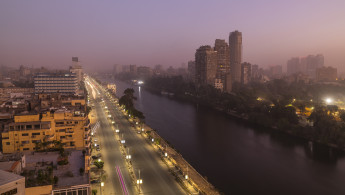Egypt says no to private German school's biology lessons on homosexuality
Egypt's National Council for Childhood and Motherhood (NCCM) filed over the weekend an official complaint before the prosecutor-general, accusing an international school of allegedly promoting homosexuality among school children as the decades-long stigma persists.
In its complaint, the most recent of similar ones made by parents, parliamentarians, and lawyers, NCCM accused the management of Rahn Schulen Kairo, a Cairo-based German school, of teaching students of year six content encouraging the acceptance of same-sex relations as a regular act within its biology curriculum, state-run Al-Ahram newspaper reported on Sunday.
Lawyer Ashraf Nagi, representing one of the parents, told local news outlets that he had enclosed to the case file translated copies of the study materials, including ideas that allegedly "incite immorality and homosexuality."
Nagi said the curriculum suggested that "young men and women should be free to choose their partners even if they were of the same sex with no consideration to religious values and social and ethical mores."
The complaints sent shockwaves across the ultraconservative North African country, prompting the authorities and the Ministry of Education to investigate these claims and summon school representatives for questioning.
The ministry said it had formed a committee of educational experts to investigate the lessons, "totally rejecting any attempts by any school on Egyptian soil to advocate or teach concepts that contradict the instinctive nature of human beings, divine revelation, social values or morals."
The New Arab could not independently verify the material in question.
Local and international human rights groups have over the years slammed Egypt over the ongoing crackdown on the LGBTQ+ community, but discrimination is commonplace.
"The queer community in Egypt commonly hide their sexual orientation due to the persistent stigma and the subject being viewed as a taboo," a prominent human rights lawyer told TNA.
"Even though homosexuality has not been explicitly criminalised by Egyptian law, members of the LGBTQ community are usually prosecuted under related charges such as 'sexual indecency', 'immorality' and 'debaucher.' Most of them reported violations committed against them in custody," the lawyer said, on condition of anonymity due to the subject's sensitivity.
A recent BBC report revealed that the Egyptian vice police used fake identities to hunt gay men via dating apps.
For years, Egypt has banned several Western films that involved homosexual references or scenes as the country's media regulator, the Supreme Council for Media Regulation, has long attempted to regulate the shows on online streaming platforms, such as Netflix and Disney+, to ensure that the content adheres to "societal norms and values."
Films banned in the country include Pixar's Lightyear and Marvel's Doctor Strange in the Multiverse of Madness and Milk.
In 2017, an open-air concert in Cairo was held by Lebanese band Mashrou' Leila, where the flag represents the lesbian, gay, bisexual, and transgender community, prompting public backlash in the predominantly-Muslim country amid demands for legal accountability. Several were arrested and charged as a result.
In 2022, a controversial rom-com Arabic adaptation of the popular film "Perfect Strangers," entitled "Ashab Wala Aaz", an Arab movie produced by Netflix, stirred up a heated debate in Egypt and the Arab world for "promoting homosexuality" and portraying social taboos.
In Egypt, both the Coptic Orthodox Church, to which most of the country's Christian minority belong, and Al-Azhar, the region's highest Sunni Muslim authority, do not, even in principle, accept the concept of same-sex relations.
However, religious entities outside Egypt and the Arab World, including the Vatican, exhibited tolerance towards the subject as the debate and homophobia remain in place.





 Follow the Middle East's top stories in English at The New Arab on Google News
Follow the Middle East's top stories in English at The New Arab on Google News


